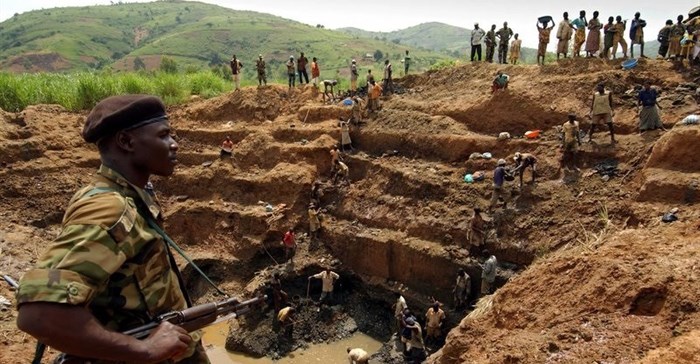
According to the group, up to $17m of gold produced by Chinese-owned company, Kun Hou Mining, went missing and was likely smuggled out of Congo into international supply chains.
At the same time, the Congolese state lost out on tax revenues on up to $38m of artisanal gold produced per year during the gold rush, due to smuggling and misconduct by provincial authorities.
The gold rush, focused on the Ulindi River in Shabunda, eastern DRC, reached its peak in 2014 and 2015 and continues to this day. Evidence gathered by Global Witness also shows a provincial authority colluded with armed groups in illegal taxation of miners while another altered official export documents so gold looked as though it was coming from legally-operating mines.
Armed groups, known as Raia Mutomboki, received at least two AK-47 assault rifles and $4,000 in cash from Kun Hou Mining, which operates mechanised gold dredging machines along the river. These armed men taxed the artisanal miners operating locally-made dredgers. Local authorities also collaborated through a tax sharing deal.
“There were over 500 cases of malnutrition reported in Shabunda town in 2014 and yet the significant revenues generated by this gold boom benefitted armed men and predatory companies instead of the Congolese people” says Sophia Pickles, senior campaigner at Global Witness. “The government must enforce its own laws to ensure that companies in its gold sector do not produce or trade gold that has funded armed groups. Any company breaking these laws must be held accountable for their actions. Provincial mining authorities that fail to properly govern the minerals sector must also be held liable.”
Global Witness’ research shows that almost half a million dollars’ worth of Kun Hou’s gold was exported to a Dubai company through official channels. The rest of the company’s estimated $17m of gold production is likely to have been smuggled out of the country.
Evidence was also found that mining officials in the provincial capital, Bukavu, deliberately falsified documentation to obscure links to Shabunda. Officials changed the gold’s origin on official export documents to show instead it came from the handful of legally-operating artisanal mines in South Kivu. This pattern has been repeated with other mines in the province. As a result, it is much more difficult for international buyers to be sure that gold has not funded armed groups.
“Provincial authorities overseeing Shabunda’s boom have, by their actions over the past two years, directly undermined international and the national government’s efforts to reform eastern Congo’s artisanal gold trade,” said Pickles. “States have a responsibility to ensure that companies do no harm, including checking supply chains for links to conflict and human rights abuses – Congo and the United Arab Emirates have dramatically failed in this respect.”
In recent years there have been significant international efforts to tackle the link between violent conflict, human rights abuses and the minerals trade in Congo and elsewhere including international supply chain guidance set out by the Organisation for Economic Cooperation and Development (OECD) five years ago, which has been a legal requirement in Congo since 2012. The US also passed a law and most recently industry supply chain guidelines, based on the OECD standard, were agreed in China. These set a precedent for Chinese companies to recognise and reduce supply chain risks and if adhered to should allow companies sourcing minerals from high-risk areas to do so responsibly.
Kun Hu Mining refused to comment in response to three requests from Global Witness, while the local artisanal support organisation, SAESSCAM, have strongly denied that its agents collaborated with armed groups.